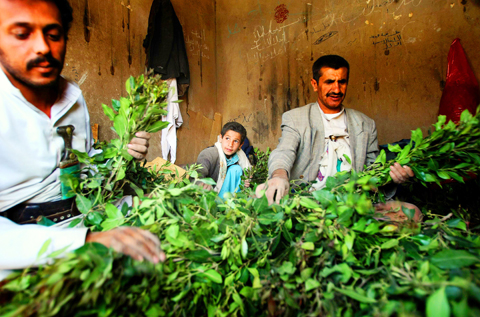For Yemenis, the mild narcotic qat is as much a part of the social fabric as an after-dinner drink in the West and, as with brandies, connoisseurs want the best varieties. But the trees that produce the most sought-after leaves now lie in a war zone.
Mohammed Ahmed Ghanem runs a stall selling qat in the Yemeni capital.
Prices for an afternoon’s worth of the stimulant leaves can run anywhere between US$2 and US$100 depending on quality.

PHOTO: AFP
But the very best, known as Shami, is no longer available, Ghanem acknowledges ruefully.
The escalation since August of the Yemeni government’s conflict with Shiite rebels in the mountains of the far north mean that growers can no longer get their produce to market in Sanaa.
Shami is one of a number of varieties of qat cultivated with a view to satisfying the leisured elite of what is one of the world’s poorest countries.
“If I didn’t use qat, I’d be cut off from all my friends and relatives,” one well-to-do user said as he lounged on cushions in a Sanaa salon, his cheeks bulging with a wadful of leaves.
Qat is legal in Yemen, but like many better-off users he did not want his name used in print.
In neighboring Saudi Arabia, as in the US and some European countries, the drug is banned. And even in Yemen, the authorities have tried — with limited success — to restrict its use in government offices.
“I know all about the economic and social costs but I can’t live without it,” the user said.
Every day, he knocks off work around noon to buy his day’s supply. It is the bitter juice of the leaves that users extract through prolonged mastication, so it is important that they be as fresh as possible.
He then changes out of his Western-style suit into traditional Yemeni cloak, belt and dagger and heads down to the salon.
“It’s the best moment of the day,” he said.
For Yemeni men, the qat session is an opportunity to cement social ties, to debate issues of the day, to put the world to right. But increasing numbers of women and teenagers indulge in the habit too.
Sales of qat in Yemen are estimated to run to US$800 million a year, a huge sum in a country with GDP per head of less than US$1,000.
Qat can earn farmers three times the revenue of any other crop but irrigating it takes a huge toll on the country’s aquifers, with 85 percent of the country’s wells used for qat cultivation.

Asian perspectives of the US have shifted from a country once perceived as a force of “moral legitimacy” to something akin to “a landlord seeking rent,” Singaporean Minister for Defence Ng Eng Hen (黃永宏) said on the sidelines of an international security meeting. Ng said in a round-table discussion at the Munich Security Conference in Germany that assumptions undertaken in the years after the end of World War II have fundamentally changed. One example is that from the time of former US president John F. Kennedy’s inaugural address more than 60 years ago, the image of the US was of a country

BLIND COST CUTTING: A DOGE push to lay off 2,000 energy department workers resulted in hundreds of staff at a nuclear security agency being fired — then ‘unfired’ US President Donald Trump’s administration has halted the firings of hundreds of federal employees who were tasked with working on the nation’s nuclear weapons programs, in an about-face that has left workers confused and experts cautioning that the Department of Government Efficiency’s (DOGE’s) blind cost cutting would put communities at risk. Three US officials who spoke to The Associated Press said up to 350 employees at the National Nuclear Security Administration (NNSA) were abruptly laid off late on Thursday, with some losing access to e-mail before they’d learned they were fired, only to try to enter their offices on Friday morning

Cook Islands officials yesterday said they had discussed seabed minerals research with China as the small Pacific island mulls deep-sea mining of its waters. The self-governing country of 17,000 people — a former colony of close partner New Zealand — has licensed three companies to explore the seabed for nodules rich in metals such as nickel and cobalt, which are used in electric vehicle (EV) batteries. Despite issuing the five-year exploration licenses in 2022, the Cook Islands government said it would not decide whether to harvest the potato-sized nodules until it has assessed environmental and other impacts. Cook Islands Prime Minister Mark Brown

STEADFAST DART: The six-week exercise, which involves about 10,000 troops from nine nations, focuses on rapid deployment scenarios and multidomain operations NATO is testing its ability to rapidly deploy across eastern Europe — without direct US assistance — as Washington shifts its approach toward European defense and the war in Ukraine. The six-week Steadfast Dart 2025 exercises across Bulgaria, Romania and Greece are taking place as Russia’s invasion of Ukraine approaches the three-year mark. They involve about 10,000 troops from nine nations and represent the largest NATO operation planned this year. The US absence from the exercises comes as European nations scramble to build greater military self-sufficiency over their concerns about the commitment of US President Donald Trump’s administration to common defense and